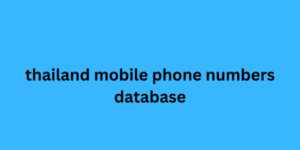jason-leung-SAYzxuS1O3M-unsplash
The competition is growing all the time while more often than not, the space you want to appear in is a piece of glass about the size of half a slice of bread—your smartphone. More bad news: Getting to the top of organic search usually requires having one of the most authoritative websites in your industry. That takes years of effort to create great content and optimize thailand mobile phone numbers database it better than everyone else trying. Now I’m going to turn to paid search and ask you to think about one last obstacle: At the top of most search engine results pages (SERPs), users see paid ads. For these types of searches, the best blog post, ebook, study, video, infographic, or product page in the world won’t outrank AdWords ads. Pay-per-click ads typically dominate the top of search results. Now for the good news… You can pay for the privilege to have a link to your page appear. But don’t be fooled by the casual pay-per-click (PPC) advocate. It’s hard to justify investing your marketing dollars into the program over and over again. You have to get good at it. You have to make more money than you spend. Let’s look at seven ways to avoid burning money on AdWords, so you can make money from the world’s most used advertising network.
1. Defeat "click fraud"
If left unchecked, click fraud (fraudulent clicks on your ads with the sole intent of harming you) can eat up your entire PPC budget. Last year, CNBC reported alarming statistics on the subject :
In 2016, nearly 20% of all digital advertising spend was wasted due to click fraud.
Click fraud will cost brands $16.4 billion globally in 2017.
Wow. Search engines tell you they do everything in their power to fight click fraud and invalid traffic, but you’d be foolish to rely on their countermeasures alone. The way to protect your budget is to proactively respond with a tool like ClickCease that’s specifically designed to help you fight click fraud. Powered by log information, AdWords customers can identify IP addresses, referring websites, and geographic areas where fraudulent activity is coming from and block fraudulent activity.
stop click fraud
You can also dramatically reduce click fraud on the Display Network by using exclusions and managed placements.
2. Focus on buyer intent
All searches are created equal. With CPC (cost per click) increasing every year, search engine marketers can no longer afford to think about all the searches for specific keywords that represent quality signals of purchase intent.
saving money on adwords

Ignoring signals can significantly reduce performance. Understand how prospects interact with your brand at different stages of the sales funnel , and align your campaign accordingly by making the most relevant offer at each level of search intent .
3. Bid on your brand keywords
Is it wise to cut your budget by not bidding on keywords associated with your brand or products? Many would say, "Yeah, we'll show up in the results for those phrases anyway." But there's one important thing to consider: If you don't control the ads that appear when your brand is searched for, one or more of your competitors will. This is dangerous.branded searches in adwords
“The first reason to bid on your brand is to make sure your competitors aren’t bidding higher than your organic result and stealing valuable clicks in the process,” writes Joe Putname of iSpionage. (Note: Their service alerts you when competitors are bidding on your branded terms.) Another thing to consider is that branded clicks tend to be inexpensive. You can expect high-quality scores for branded terms, which keeps click costs very low. The average CPC is likely to be just a fraction of the price you’d pay for other keywords. And these words convert well, too.
4. Beware of generic correspondence
Understanding the difference between broad match and exact match . With broad match, the default keyword setting in AdWords, your ads will appear for searches related to your keywords, not specifically for your exact keywords. Broad match is the way to go when you want to reach the widest possible audience. However, “banking” in broad match hits your bank account harder.
